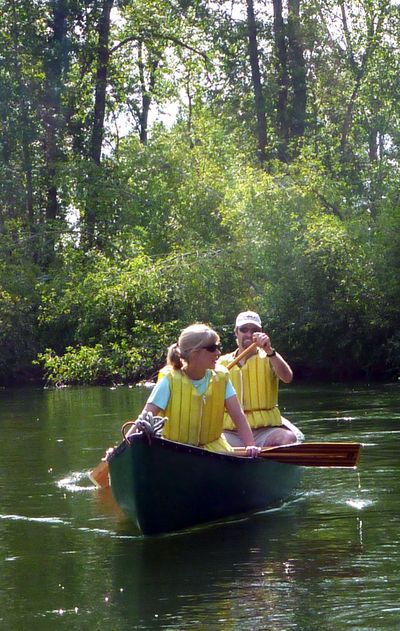Wash.’s new Discover Pass slow to be discovered by masses

Despite statewide media reports for the past several months, people are still showing up at Washington state parks with no clue that a Discover Pass has been required for vehicles entering parks and other state lands since July 1.
“We’re in the education and information phase,” said Chris Guidotti, manager of Riverside State Park. “We’re selling a lot of passes to people who show up at the park without them.”
The new $30 annual ($10 daily) vehicle access permit was created by the 2011 Washington Legislature as lawmakers wrestled with ways to keep parks open through the state’s budget crisis.
With some exceptions, the pass is required on all street-legal vehicles, including motorcycles, in state parks as well as on lands managed by the state departments of Natural Resources and Fish and Wildlife.
At Mount Spokane State Park, “Most of the motorcyclists haven’t got the message yet, but otherwise compliance is pretty good,” said Steven Christensen, park manager.
The most common complaint is that the Discover Pass is not transferrable to another car, say the rangers at both of the Spokane-area parks.
“When people learn that they can’t transfer the pass from the wife’s car to the husband’s vehicle, they get upset,” Guidotti said.
Some families might need two or three passes to accommodate the different vehicles they use for visiting parks, state wildlife lands for hunting and fishing or state recreation areas for boating.
Paddlers running the Little Spokane need at least two vehicles with passes to run a shuttle.
Some Riverside State Park visitors are trying to avoid getting the pass by parking along Aubrey White Parkway instead of designated lots, Guidotti said. “We can’t put a sign out at every little pullout. If you’re in the park in a vehicle, the fee applies,” he said.
The cost of the pass continues to confuse the public, state officials say:
• If purchased at a state park, the annual Discover Pass costs the face price of $30.
• If purchased at some private vendors, a $2 dealer fee is charged.
• If purchased online or where hunting and fishing licenses are sold, dealer and transaction fees totaling $5 are added to the $30 cost of the pass.
REI stores have Discover Passes and are charging the $2 dealer fee. Since REI is not online with state fishing and hunting license sales, there’s no $3 transaction fee. However, that also means that if REI runs out of stock, they can’t issue a pass from an online machine. They must wait for a new delivery.
Even Riverside State Park temporarily ran out of passes the first week of July.
Mountain Gear in Spokane has applied to sell Discover Passes, but they had not been received by midweek.
“State Parks faxed me 16 pages of information and four pages of contract we had to sign and send back for their review,” said John Schwartz, retail store manager.
State parks rangers are on the front line of the Discover Pass transition.
“We’re taking a deep breath and settling into it,” Guidotti said. “We may be seeing slightly fewer people in the park, but I can’t say for sure yet.
“The park campground is still booked full,” he added, noting the Discover Pass isn’t required for registered campers.
Boat launching is another big issue, Guidotti said.
The way the law is written, people launching boats at the state park ramps at the mouth of the Little Spokane River and at Nine Mile must have Discover Passes on their vehicles and pay the $7 boat launch fee in addition.
People who use state parks boat launches more than 10 times a year should buy the Washington State Parks Natural Investment Permit. For $70, it allows yearly use of park boat ramps and dump stations. And it’s transferable to another vehicle.
But it’s not valid for Washington Fish and Wildlife boat access sites or DNR lands.
“I’m sure these are things the state will work out eventually,” Guidotti said. “It needs to be cleaned up and made simpler for the public.
“I’m sympathetic to people who don’t like the pass the way it is. But they seem to be more receptive when they hear that the alternative was closed gates at some parks.
“Most people have been pretty supportive,” Guidotti said, although he shook his head recalling two women who drove into the Bowl and Pitcher area on the Fourth of July – when the park was still offering a grace period for compliance with the pass requirement.
“They said they were coming to say goodbye to the park because they were never coming back,” he said. “That’s sad. We wrote them a complimentary day pass and wished them well. What else could we do?”